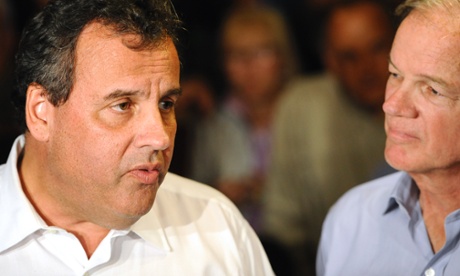Amount of freedom Kaci Hickox will have under quarantine in Maine remains unclear as states grapple with new measures

A nurse released from an Ebola quarantine tent in a New Jersey hospital was making her 600-mile journey home to Maine on Tuesday, but how much freedom Kaci Hickox will have in the final two weeks of her quarantine period remains unclear.
Under Maine’s state guidelines, healthcare workers returning from one of the three west African countries worst affected by the Ebola outbreak must be quarantined for 21 days in their homes. Hickox is the first to be subject to such a measure. The state has not said whether the quarantine is voluntary, or how it might be enforced.
“We certainly understand healthcare workers’ desire to get home after doing good work in west Africa,” said Maine governor Paul LePage. “But we must be vigilant in our duty to protect the health and safety of all Mainers, as well as anyone who may come in contact with someone who has been exposed to Ebola.”
Everyone returning to Maine from Guinea, Liberia or Sierra Leone will undergo daily monitoring. Effectively, that means people returning from the countries will be called by the Maine health department daily. Returning healthcare workers will have to check their temperature twice a day, receive daily calls and remain in their homes.
Those infected with Ebola show symptoms within 21 days, and only when symptomatic are patients contagious. The disease is spread through body fluids, such as vomit or blood. Many believe mandatory quarantine measures could remand healthy, asymptomatic workers to their homes when they’re at no risk of infecting others.
“Public health [policies] are not arbitrary. They’re built on what we know about the virus and how it’s transmitted,” said Dr William Schaffner, an infectious disease expert from the Vanderbilt University School of Medicine. “I, at least, find no real scientific reason to oblige people who’ve come back from west Africa to be quarantined in their home, to have their movements curtailed, to have their civil liberties curtailed, if they have no real symptoms and if they’re in a monitoring program.”
State guidelines have evolved quickly over the last week. New quarantine measures have been variously announced by both politicians and health departments. While new policies look to curb anxiety, not all are not entirely transparent or based on science.
The federal Centers for Disease Control and Prevention (CDC) issued new guidance on Monday, recommending six states undertake active monitoring programs. Effectively, this means health departments call returning travelers once a day, and require those in direct contact with Ebola patients report their temperatures. Those six states – New York, Pennsylvania, Maryland, Virginia, New Jersey and Georgia – receive about 70% of travelers from Ebola affected areas in Africa.
Some states do not believe the CDC’s guidelines are enough.
Hickox was quarantined in an in-hospital tent in the confusion following New Jersey’s policy change. Hickox flew into Newark airport on Friday following volunteer work in Sierra Leone. The nurse was questioned and held at the airport in Newark for almost seven hours before being placed into mandatory quarantine in the city’s University Hospital. Though Hickox was released, it’s unclear whether the policy has officially changed.
Hickox is suing on the grounds that the mandatory quarantine violated her civil rights and was scientifically unfounded. While she was allowed to leave the hospital, New Jersey governor Chris Christie maintains he has not changed the policy.
The mandatory quarantine measures have exposed two conflicting needs: to counter public concern, and the need to recruit volunteer healthcare workers to the fight against Ebola in west Africa.
“There are other ways to adequately address both public anxiety and health imperatives,” said Sophie Delaunay, executive director of Doctors Without Borders in a statement on Monday. She said that adding a three-week quarantine period to normal tours of between four and six weeks could severely hamper recruitment efforts.
“The response to Ebola must not be guided primarily by panic in countries not overly affected by the epidemic,” Delaunay said. “Any regulation not based on scientific medical grounds, which would isolate healthy aid workers, will very likely serve as a disincentive to others to combat the epidemic at its source, in west Africa.”
